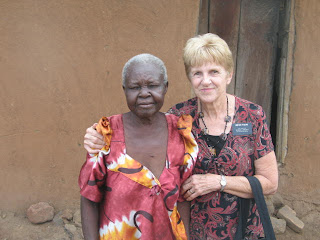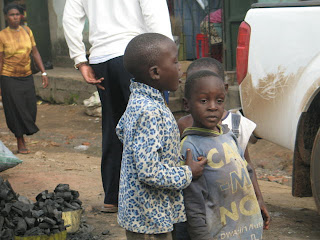KAMPALA STAKE GIRLS CAMP

We were called upon to assist with the stake young womens camp activities. It was a two day camp where no one camped. Sort of like a Cub Scout Day Camp.

The activities were held in and around the stake center.



We assisted with the activities held the morning of the first day, then we had a two hour block of time to fill the afternoon of the second day. We shared that time with the first counselor in the stake presidency. Approximately 100 girls were in attendance.
INSPECTING MISSIONARY APARTMENTS

We are responsible for inspecting missionary apartments. That really makes us popular with the missionaries, because it means they have to do some serious house cleaning occasionally.
Actually, they are excited when we come, because Sister Thayn makes snickerdoodle cookies for them.

Of course, the sisters apartments are generally spotless. A few days after visiting their apartment the sisters called to get the recipe for the cookies.


We visited the Kijjansi Branch president and his family to get him to help us as we reviewed a listing of his branch members to see how many were still in his branch, and how many of the men that show up on the records as unordained are still unordained. It was a great experience. They are a wonderful family. He has been branch president for the eight years the branch has been organized.

This is the view from the door of the branch presidents door.

Little children are beautiful and innocent wherever they live in the world.

This grandmother walked out from behind the curtain that hung over her doorway when she saw us walking by and gestured that she would like to have her picture taken with Sister Thayn.

Now I have to figure out how to turn the truck around so we can make our way back along the pathway by which we entered.

It wasn't long before we started drawing a crowd, especially of children. Sometimes they will approach us and touch our skin, I suppose to see what our white skin feels like.

 Whenever we take their picture, they are excited to see themselves on the camera screen.
Whenever we take their picture, they are excited to see themselves on the camera screen.THE MANY HATS LEADERS MUST WEAR
IF THEY HAVEN'T LEARNED TO DELEGATE

I have started training the Kampala stake presidency. The first of three one and a half hour sessions focused on principles of priesthood leadership that are found in the Handbook of Instructions but often overlooked, or misunderstood in relationship to their specific callings.
They were somewhat surprised and excited to learn some of the things that were taught. They didn’t want the meeting to end.
These are great men of faith and dedication to the Lord's work. I am confident that they will set a new standard for priesthood leadership in Uganda.
The stake presidency, surrounded by the stake council are ready to experience the training again. This time, however, the presidency will learn things at a different level than what they did the first time they heard it.
JINJA DISTRICT PRESIDENCY, WITH BRANCH
AND ELDERS QUORUM PRESIDENCIES
PREPARING FOOD FOR THE
JINJA WARD CHRISTMAS PARTY
Cleaning small rocks and other undesirables from the rice in preparation for the party.
Chickens are not safe here, especially during the holidays. They have just killed the chickens and now they are cleaning and cutting them up before tossing them into a big pan on the fire.
A typical outdoor meat market.
Strolling through an outdoor market to buy food, particularly vegetables. Food in the outdoor markets is fresher, though often dirtier, and less expensive than buying it at the super market. The typical Ugandan only shops at these markets because they cannot afford to pay the price that is charged in the stores.
Marabou Storks
With the food cooked, it is time to pick up a plate and pass by the ladies serving at the table.
Here the branch president with his wife and child are enjoying the food. They eat without utensils. That's right, they just "dig in" with their fingers. Although we much prefer eating with utensils, we also eat with our fingers in these kinds of meals.
Drinks are delivered on a boda boda.
We have attended several Christmas parties this past week and have one more to go. It will be with the young missionaries. Sister Thayn has been in the baking and salad making business. The potato salad she made required fifty eggs and a lot of potatoes. It is very tasty, and I am sure there will be nothing left to bring home.
WE TRAVELED ABOUT 15 MILES NORTH OF
KAMPALA TO VISIT AN ORPHANAGE
 The orphanage we visited is located a couple of miles off the highway in a forested area. The orphanage has about 54 children who were living on the streets or otherwise abandoned by their parents. The man and his wife, Caleb and Rhita, started the orphanage. They are classic modern-day good Samaritans. When he was a young boy, he was abandoned and lived on the streets for four years when a family took him in and gave him a home and schooling, and helped him until he finished college. He and his wife are college graduates and now devote their lives and their resources to raising these children.
The orphanage we visited is located a couple of miles off the highway in a forested area. The orphanage has about 54 children who were living on the streets or otherwise abandoned by their parents. The man and his wife, Caleb and Rhita, started the orphanage. They are classic modern-day good Samaritans. When he was a young boy, he was abandoned and lived on the streets for four years when a family took him in and gave him a home and schooling, and helped him until he finished college. He and his wife are college graduates and now devote their lives and their resources to raising these children. They are trying to teach the children how to live off the land and be self-sufficient. Our visit with them will be remembered as one of our most memorable Christmas’.
Two paralyzed children incapable of moving or feeding themselves. The older girls feed and care for them.
Their eyes lit up when they were each presented with a new blanket.
This structure serves as a chicken coop on the left, and a kitchen on the right. The structure in front is where the children place their plates and cups after washing them in water they have to pump from a deep well.
This young man is the cook. For his services, he receives food and a place to sleep, and he is grateful for it.
It is hard to believe that this is kitchen where he prepares three meals a day, seven days a week, for 54 children plus the adults who help care for the children. Makes us appreciate our kitchen back home.
Those of us who visited the orphanage, were asked to plant two fruit trees in remembrance of our visit. After planting this one, I was asked to give it a name. I named it Dottie in memory of our long lasting and fruitful relationship over the past 52 years.
The children were excited to receive apples, oranges and blankets we brought to them.
This is Daniel. He looks like a typical five or six year old boy. However, he is a fifteen year old pygmy.

Olivia is one of the great faithful members of the church in Uganda. She has devoted her life and talents to helping lift others out of poverty by teaching them how to become self sufficient. We call her the "Mother Terese" of Africa. She one of the most amazing women we have met and is worthy of a story all her own.
This is Caleb and Rhita - before joining the church.
This is Caleb and Rhita ready to be baptized.
On our drive home from the orphanage, we marveled at the sights and sounds of life in Uganda and felt a deep appreciation for the bounteous blessings we have been privileged to enjoy throughout our lives..
Typical roadside shops arranged side by side along nearly every road.
A man pushing a bicycle carrying the frames for two sofas and four matching chairs that will be covered with foam and fabric and sold as living furniture.
IT'S CHRISTMAS TIME IN UGANDA
 We are now in the sixth week of our mission and our thoughts are increasingly focused on the life and mission of our Savior, Jesus Christ. Although we miss the excitement of the holiday season, we are filled with gratitude for all we have been blessed with throughout our lives.
We are now in the sixth week of our mission and our thoughts are increasingly focused on the life and mission of our Savior, Jesus Christ. Although we miss the excitement of the holiday season, we are filled with gratitude for all we have been blessed with throughout our lives. As we reflect on those times of pain and suffering that we have experienced in our lives, we now see them through different eyes. Most of the people we see and associate with here face greater challenges on a daily basis than we can relate to, yet they appear happy. I suppose it has something to do with their having expectations that are commensurate with their standard of living.
As we reflect on those times of pain and suffering that we have experienced in our lives, we now see them through different eyes. Most of the people we see and associate with here face greater challenges on a daily basis than we can relate to, yet they appear happy. I suppose it has something to do with their having expectations that are commensurate with their standard of living. This a charcoal and fish market along the street near where we live. Charcoal is used to cook with by most Ugandans. Those who do not use it have nice homes with nice kitchens. And even those use charcoal when they have a lot of guests to cook for because they will do the cooking outside on the ground much like we would cook with dutch ovens.
 In general, these people are self-sufficient. They are accustomed to doing without the most basic things we require to be happy. Many have to work long and hard for what little they receive. And in those cases, they use their meager resources to acquire food, shelter, and air time for their cell phones, of course. On second thought, maybe cell phone air time should be put before food and shelter.
In general, these people are self-sufficient. They are accustomed to doing without the most basic things we require to be happy. Many have to work long and hard for what little they receive. And in those cases, they use their meager resources to acquire food, shelter, and air time for their cell phones, of course. On second thought, maybe cell phone air time should be put before food and shelter.DECEMBER 2, 2010
AFTER ABOUT ONE WEEK HERE, IT'S SAFARI TIME
Crossing the Nile.
A view of the Nile from our room.
A typical view of the country side as we watched for animals.
With his ears pushed out, he was letting us know that we were not welcome.
Setting sail on a Nile cruse.
A small village we passed as we exited the wildlife park.




































































